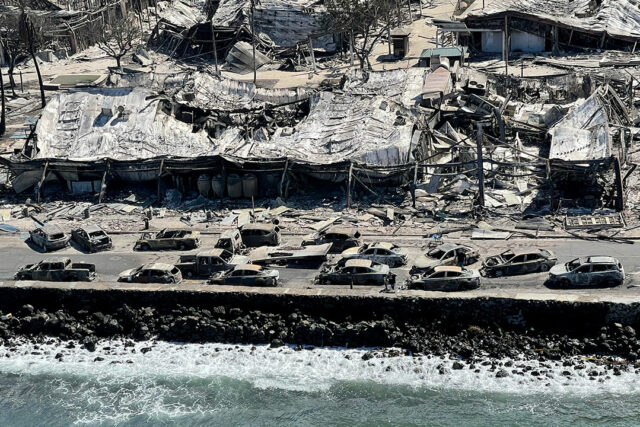TOP OFFICIALS at the US Department of Homeland Security (DHS) received a memo on Friday ordering an immediate stop to work connected to climate change and the elimination of climate-related terms across the agency.
The memo instructs senior office heads to “eliminate all climate change activities and the use of climate change terminology in DHS policies and programs, to the maximum extent permitted by the law,” according to the document seen by Bloomberg News. The changes are meant to bring “alignment” with Mr. Trump’s executive orders that reverse multiple climate-related orders by former President Joseph R. Biden, it said.
The directive from DHS Secretary Kristi Noem marks the latest move by President Donald Trump and his appointees to roll back federal efforts to address global warming and could affect disaster response capabilities which are overseen by DHS.
DHS did not immediately provide a comment outside of regular business hours on the climate-related contents of the memo.
In the three weeks since Mr. Trump’s inauguration, his administration has already moved to withdraw from the Paris Agreement, halted the flow of billions of federal grant dollars funded by two major climate laws, and abruptly fired or put on administrative leave hundreds of Environmental Protection Agency staff who work on climate or environmental justice.
Activities impacted by Ms. Noem’s new directive at DHS include modifying or terminating contracts related to climate change, ending participation in climate working groups, revising or rescinding climate policies and ending reporting requirements. Ms. Noem also ordered agency leaders to remove “climate change terminology in all DHS programs, policies, products, communications, and activities,” according to the document. In her previous job as South Dakota governor, Ms. Noem questioned the established scientific consensus that humans have caused climate change, Politico reported.
With a workforce of more than 260,000, the Department of Homeland Security is an umbrella organization that includes Citizenship and Immigration Services, the Coast Guard, and Customs and Border Protection, among other offices. But perhaps the one most impacted by the new directive is the Federal Emergency Management Agency (FEMA), the nation’s primary means for organizing federal responses to disasters. As wildfires, storms and floods increase in frequency and intensity due as a result of rising temperatures, FEMA has been responding to more disasters and spending more money to help impacted communities.
The climate reversal inside DHS comes against a backdrop of worsening indicators. Experts confirmed last month was the hottest January on record, surpassing a high mark set in January 2024, and scientists published two recent studies concluding that global average temperatures have likely already warmed 1.5C above preindustrial levels. FEMA has been busy, meanwhile, dealing with the aftermath of Los Angeles wildfires that destroyed thousands of buildings and will likely rank among the most expensive disasters in US history.
It’s been a chaotic period for federal workers involved in disaster response. On Feb. 9, Ms. Noem told a CNN interviewer she would seek to “get rid of FEMA the way it exists today.” Shortly thereafter a senior FEMA official allegedly ordered a freeze on grants in defiance of a judicial order, NBC News reported.
Around this same time, DHS announced that it had fired four FEMA staff, including its long-time chief financial officer, over accusations of “circumventing leadership to unilaterally make egregious payments for luxury NYC hotels for migrants,” according to the Washington Post. The payments in question are part of a DHS grant program previously appropriated by Congress.
It’s unclear what will change inside FEMA and elsewhere at DHS as a result of the memo, but experts worried about far-reaching consequences.
“Erasing the words ‘climate change’ is bad,” said Samantha Montano, a disaster researcher at the Massachusetts Maritime Academy. “But there are ways to work around that.” She worried that eliminating any funds to climate-related programs would become “a much bigger kind of operational problem.”
Carrie Speranza, the former chair emeritus of FEMA’s National Advisory Council before the Trump administration disbanded the group last month, raised concerns about how the agency would now respond to big disasters that often have a strong link to rising temperatures.
“We just need to make sure that we acknowledge that these disasters are getting bigger,” she said. “And so that just requires more resources at the end of the day.” — Bloomberg










